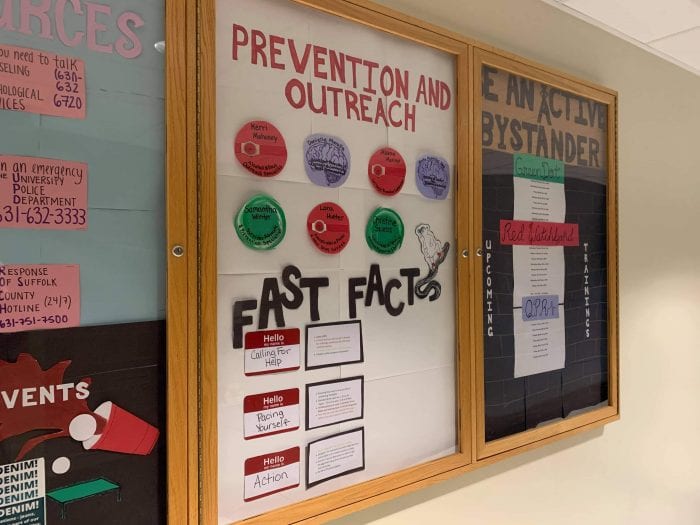Stony Brook University Makes Mental Health a Priority

Stony Brook University knew that students might have a hard time this year as they returned to school in the midst of a global pandemic.
But for those who went home to participate in hybrid and virtual learning, they too could use someone to talk to. That’s when the school stepped up and implemented new programs to help kids on campus and at home, near and far, to give them resources and let them know everything will be OK.
‘Now more than ever, we need to connect and feel a sense of belonging — and these spaces are intended to do just that’
— Danielle Merolla
The Center for Prevention and Outreach is collaborating across different university departments to support students’ mental health, and is in the process of hiring more mental health staff.
According to Danielle Merolla, a clinical psychologist and assistant director of mental health outreach and community-based interventions at CPO, her group offers ongoing support through various virtual and hybrid programming.
With programs like Let’s Talk, a brief nonclinical conversation with a counselor, also workshops for coping and connection, balancing levels of care for self and others, and mindfulness, CPO provides suicide prevention bystander intervention training called Question, Persuade, Refer for students, faculty and staff.
“We have trained over 800 students since the onset of COVID via virtual platforms,” Merolla said.
CPO has also implemented three mental health peer education programs called Chill, Global Minds Alliance and Minds Matter that have been developed and created spaces for students to connect and receive information about how to care for themselves and each other, according to the assistant director.
“The resources on campus are intended to support students’ overall health and well-being,” she said. “We want to make sure students know that they are not alone, and there are supports literally at their fingertips as many of our resources are accessible virtually.”
According to a recent study with the Journal of Medical Internet Research, the COVID-19 pandemic has brought the vulnerable population of student’s mental health into focus. The study interviewed 195 students at a large public U.S. university to understand the effects of the pandemic on their mental health.
Of the students questioned, 71% indicated increased stress and anxiety due to the coronavirus crisis. Multiple stressors were identified that contributed to the increased levels of stress, anxiety and depressive thoughts among students. These included fears and worry about their own health and of their loved ones, with 91% reporting negative impacts due to the pandemic, and 89% reporting a difficulty in concentrating.
“Now more than ever, we need to connect and feel a sense of belonging — and these peer spaces are intended to do just that,” Merolla said.
With an unusual mix of students either staying on campus or learning from home, CPO decided that it needed to make all its resources available to students within Stony Brook and abroad.
“We adapted all our programs to meet the virtual needs of our students,” said Smita Majumdar Das, a clinical psychologist at CPO. “We also adjusted programming time — offering training at 6 a.m., or later in the day such as after 9 p.m. — to accommodate our students who are dispersed all over the U.S and also in international locations.”
Das said that at CPO, she has seen a five-fold increase in the utilization of virtual Let’s Talk since the onset of COVID-19 — not only domestically, but with their international students in France, India, Korea and Japan, as well.
“CPO has worked with various employees to provide the needed training so they can be effectively present for our students and provide them the best support and care possible,” Das said. “It is impossible to pour from an empty jar, so as an organization we are extremely mindful to make sure staff feels cared for so that they can pay it forward to our students.”
Another program called Healing Arts provides students with engagement and learning opportunities around the themes of creative expression, self-care, coping skills, social support and campus health and wellness resources.
During the age of COVID, the program looks a little different.
“We adapted the Healing Arts model to create Healing Arts at Home in March,” said Christine Szaraz, coordinator of sexual violence prevention and outreach programs with CPO. “These programs offered livestreamed, interactive events through CPO’s social media, where students could participate in a virtual Healing Arts event using materials commonly found at home and engage with CPO staff and peer educators through the chat feature.”
Szaraz added that CPO provided a variety of synchronous and asynchronous virtual Healing Arts events throughout the summer and over Stony Brook’s opening weekend.
“Using Facebook and YouTube live forums, we engaged students with professional staff and peer educators in conversations regarding coping and self-care in response to COVID, and in relation to their transition to the fall semester at SBU,” she said.
And since school started, students are feeling the weight of the world on their shoulders.
“Often, we hear and feel that everything feels out of control which can lead to feeling unmotivated and/or stuck,” Merolla said. “It is important to acknowledge we have many choices throughout our day and there is power in each and every choice.”
“We must recognize we are stressed or struggling in order to choose to attend to what we may need,” she added. “The sooner you reach out the better. There is tremendous strength and resilience that comes from reaching out.”






